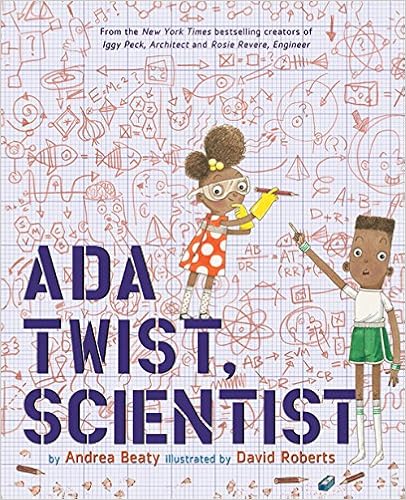
Jeez, this book is really negative about this poor kid. It leaves my 4 year old so confused.
We learn that Ada's parents think she is slow because she doesn't talk until age 3. When she finally talks it doesn't show them happy about her talking but exasperated and exhausted with her constant questions. Then it describes her asking questions but refers to it as "her chaos" and things being "in her wake" "wreaked havoc" like she is a destructive force. The pictures show Ada making messes in her quest for discovery and then the parents put her in time-out. The time-out scene is the climax of the book and the most intense and my child doesn't really understand it beyond thinking it's scary or sad. I'll break it down why it bothers me.
Ada tries to find a smell and then wash the cat. She is shown putting the cat towards the washing machine and the parents stop her and say "enough with your questions" and send her to the "thinking chair". Ada is confused. She tries to explain or understand what is happening. "But," she says and her mother cuts her off shouting "NO." "Why," she starts to ask and her father shouts "GO."
So then there's a scene of tiny Ada alone and sad on an empty two page spread, "her heart turned to goo" and she once more loses her words, which just crushes me to read each time. As a young African American girl her words and ability to speak out are her power and she just lost them (the book does not show her talking again after this page. Adults can assume but my child thinks she permanently can't talk after her parents yell at her). Then she starts thinking again and draws on the walls. The parents come back to talk and they see the wall and say to each other "we'll figure it out." So... There's no scene or explanation of the parents apologizing for how they acted when they were clearly in the wrong. There's no hugs or anything. My kid keeps taking away a totally different message that that which the author intended. She gets fixated on "Ada made a mess and that's bad" or "Ada is bad" or "Why are the mommy and daddy not listening to her" and try as I might to keep guiding her towards "scientists ask questions and that is good" that's totally not what my kid understands from the text's tone, the narrative, and pictures.
When you're making a book about a black child you have to be really careful to steer around negative stereotypes people have. The author probably thought, this is great,I I'm making a book about a black girl! But you have to think it out one step further because black children are so woefully underrepresented in media and literature and there is so much systemic racism in our kids' lives. We need to be careful how children are depicted in literature because when it's a child of a minority images and words have power to confirm negative stereotypes and prejudice in a way that they do not with images of a white child. Imagine a book about a child with "crazy messy hair." You might think it's no biggie to have the book be about a child of color but because hair differences are historically sensitive, you really shouldn't go there because you will be causing hurt feelings and reinforcing a negative stereotype. Right? Would the book "No, David" be appropriate with a non-white kid? No way, it would come off more like "the ___ boy in the class is a bad boy" etc. which is already a stereotype even with three year olds at preschool. Still following me? We have to be a little bit more careful to avoid biases and stereotypes when the book is about a racial minority child.
I am deeply disappointed that the books about the two white kids are positive and now we have a beautiful intelligent little black girl.... whose story does not celebrate her as a positive kid with qualities that her aren't are shown SMILING about and loving. The pictures show her parents: worrying that she won't speak and trying to teach her, uncomfortable with her questions, tired of her questions, angry at her and shouting, surprised at the wall, and then reading. That's it. It only shows her teacher doing one thing: freaking out when Ada does an experiment. It only shows her big brother tattling on her or being angry, then reading with the parents. There is one time in which Ada's science makes someone happy: she does Mentos in soda at school and "her chaos wreaked havoc at school" freaking out her teacher. All of the kids in the class are cheering and Ada looks super happy. But it kind of looks like science means you get in trouble at school. I just hear myself going hmmmm.
I just really feel weird about this book. It doesn't seem like it's really encouraging the child reading it to ask questions, it kind of seems more like it's a book about "don't bug your parents and don't make a mess" for a child. To us adults, the subtlety of the story makes sense and we can take away from it the message of accepting the child's questioning and mess making in the name of science. I feel that adults can take away more from this book than children, in thinking about how to parent, valuing people and relationships over objects (don't destroy your kid's heart because they made a mess or ask 5 million questions).
I don't think the author intended this result at ALL, but here it is. I'm disappointed.
No comments:
Post a Comment